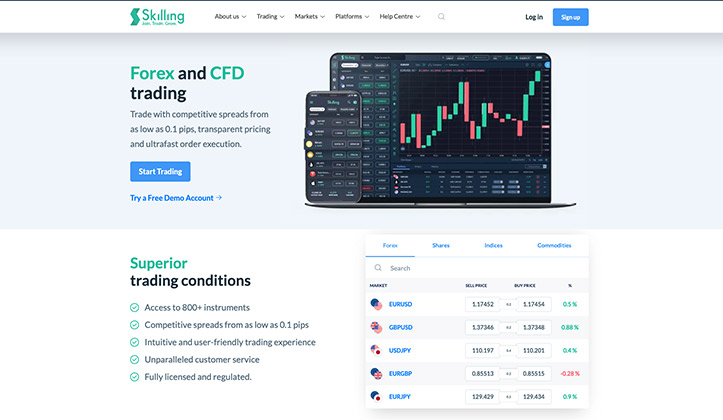9 Pitfalls in Forex Trading & Daytrading

There are several pitfalls in both forex trading and day trading. Here we are going to guide you and address some of the most common pitfalls and mistakes that can befall an inexperienced forex trader who does not know these.
With such low barriers to entry, the foreign exchange market attracts many new traders. This is especially true as this market is open around the clock, giving these new traders greater flexibility when it comes to trading currencies. The initial capital requirements are also attractive – thanks to the leverage that most brokers offer, you can get started with just a few 1000 kronor and sometimes less than that. Read our article on how much money is needed to start forex trading to get a grip on what a good start can be.
Table of Contents: Overview
- 1 Pitfall 1: Starts without training
- 2 Pitfall 2: Trading without a plan
- 3 Pitfall 3: Trading without any rules for money and risk management
- 4 Fallgrop 4: Use of excessive leverage
- 5 Pitfall 5: Having unrealistic expectations
- 6 Pitfall 6: Choosing the wrong currency broker
- 7 Pitfall 7: Forgetting rollover costs
- 8 Pitfall 8: Trying to predict news before it is released
- 9 Pitfall 9: Central Banks
Pitfall 1: Starts without training
The most common mistake in Forex trading is to believe that you can succeed without any experience or training. You would be amazed at how many new traders think they are somehow special and can make money from day one. These fantasies are often short-lived and expensive.
Trading is a skill and like all other skills on the planet it takes time to get good at it. Just like all other skills, you develop it either through trial and error or you can cut into your learning curve by learning from someone with experience, such as the team behind ForexTrading.uk. In practice, you need both.
The problem with trading is that newcomers can often confuse luck with expertise. Everyone has almost a 50:50 chance to make a first win, regardless of their skill! You would never get this with a skill like chess, painting or football – where half of the newcomers got the impression that they were experts after they first went at it. The fact is, however, that long-term results return to the trader’s average skill level (their advantage).
Investing time in a trading program like our currency school can really help you understand how markets and trading work is indispensable if you want to surpass the masses of other Forex beginners. We hope it’s with my trading skills, but if we are not for you, try to educate yourself somewhere. For those of you who really want to go in depth, our 56 factors that affect exchange rates are recommended, or that you at least go through the basics of how exchange rates are affected.
Do not try to run before you can walk! Learn the basics first, start small and slow and forget about being successful with “get rich quick” schemes. To invest time and money to get a good Forex trading education is to invest in yourself.

Rating: 9.56/10
Minimum deposit: 100 GBP
Description: Trading utan fallgropar. Prova Skilling nu!
Risk warning: 76% of retail investor accounts lose money.
Pitfall 2: Trading without a plan
Because most traders try so hard to get the most out of the trading opportunities that the markets offer, they forget to follow their trading plan – if they even have one!
By the way, this is what distinguishes a professional trader from a beginner: how they approach their daily trading.
Beginners mostly shop from store to store without having a plan and trade on emotions and tips, while more experienced traders will follow a trading plan and a routine that they spend energy and time developing. A trading plan should always be a part of your trading.
A trading plan should always be a part of your trading, so that you can make money in a more consistent way. It allows you to better discover trading opportunities and better manage your open positions. So now you understand why trading decisions should follow a well-established process according to an effective trading strategy, preferably one that has been retested.
But having a trading plan is not enough – you have to stick to it. This will help you become a more experienced trader, especially when things are not going well.
Checklist for trading plan
Keep the following in mind when deciding on your trading plan:
• Your knowledge of trade, markets, economics
• Your strengths and weaknesses
• The reasons why you shop
• Your financial goals
• How to handle large gains / losses
• Your original trading capital
• How much money you can afford to lose
• The type of analysis you will use to discover your trading sets: technical analysis, basic analysis
• What type of currency pairs you trade with the most: majors, minors, exotics
• The leverage you use
• The money and risk management rules you will follow.
Pitfall 3: Trading without any rules for money and risk management
Most beginners in the Forex market forget to use a stop-loss order, which is an automatic order that tells your broker to close your position if it reaches a certain level of loss.
If you do not use stop-loss orders, it means that you have an open risk, as your positions can vary freely depending on market price movements. There is thus a greater risk of excessive losses if things do not go your way, because you do not limit your lost positions to a certain level, which makes you vulnerable to large fluctuations towards your position.
You need to have money management and risk management rules tightly cemented in your trading plan if you want your winning trades to be bigger than your lost trades. But having money management and risk management to follow is not just about using stop-loss orders to cover your losses, there are other things to consider.
Here are some tips and risk management:
• Always use stop-loss and take-profit orders to know in advance how much money you can lose and make on a single trade.
• Set a maximum loss per week and stop trading immediately if you reach it
• Follow a risk / return ratio of at least 1: 2 if you are a trader, 1: 3 if you are a swing or position trader.
Use the right position size – risk only a maximum of 1% of your total trading capital in a single trade.
• Do not change your risk level as soon as you make money – keep it constant.
• Do not cut up or down your position when the market goes against you.
The average value down (or up) to get out of loss positions
You may have heard the saying before:
Cut your losses and let your profits run.
When losing money, it is wise to reduce your positions. But many traders fail to do so. On the contrary, they cling to their losing positions in the hope that they will turn around, or spend even more money on their lost positions.
Why would beginners do that?
Because they hope that the market will develop in their direction again, and that their current lost positions will be profitable and make even more money. In most cases, however, their losses worsen, with prices going further than expected.
While this common mistake can be a little less risky if you are a long-term investor, it is too dangerous when you are a day trader in a volatile market like Forex with a lot of leverage.
So never cut down or up a position at a loss. Open a position of the right size and use a stop-loss to avoid the temptation to cut up or down your position.
Fallgrop 4: Use of excessive leverage
Not understanding and overusing leverage is probably the most costly mistake new traders make. That was a good reason why ESMA went in and restricted it to retailers in the EU – it is very poorly understood.
Leverage and margin trading are fantastic tools that help you trade with more money than you have in your trading account, which gives you greater exposure in the market. But this only benefits you if you have a consistently profitable strategy with a positive outcome.
Leverage can just as easily magnify your losses as well as your gains, so if you do not have a winning strategy, it will end up amplifying losses and mistakes. Leverage increases profits and losses to an equal degree. For this reason, excessive use of leverage can wipe out your trading capital quickly if you do not understand and handle it properly.
There is also a psychological aspect to consider, as traders often act less rationally when dealing with outsourced positions. When you use high leverage, there is a greater individual risk for a single trade, which reinforces the psychological pressure you have to deal with when you trade. In the end, you will risk more than you can afford to lose.

Rating: 9.78/10
Minimum deposit: 50 GBP
Description: The top forex site with flexible leverage: From 1-30x. Try eToro now!
Risk warning: 68% of private investors lose money when they trade CFDs with eToro.
Pitfall 5: Having unrealistic expectations
Many beginners start trading currencies with the goal of getting rich very quickly, which often drives them to make mistakes. To stay motivated and disciplined, you need to work on setting realistic goals. If you do not set goals that are actually achievable, all they will be is a source of frustration and disappointment rather than a challenging yet achievable goal.
To implement significant changes in your trading, you should use the SMART method, so your goals are Specific, Measurable, Attainable, Relevant and Timely (specific, measurable, achievable, relevant and current). This method helps you to get structure and manageability in your financial goals.
Pitfall 6: Choosing the wrong currency broker
We have made an overview of, if not all, a significant part of the companies in the European foreign exchange market. You can find this overview here. Choosing one of the lowest rated forex brokers, such as ForexTB or is almost always a non-optimal choice.
The two best forex trading sites we have found are eToro, CMC Markets and Capital.
De två bästa sajterna för valutahandel vi funnit är Skilling och IG Markets.
Pitfall 7: Forgetting rollover costs
If you have one opened a trade and want it open overnight, you will be charged a daily interest fee, or really overnight given the time of reconciliation. This fee, or interest rate for those who prefer to call it that, will be applied to cash CFD positions held during the daily closing period. The daily closing time is 22:00 UK time. However, this may vary for international markets.
Note that futures and forwards do not charge overnight financing costs, but they have wider spreads. These contracts are usually used for long-term business. Read our article about rollover costs, which also cover all times to keep track on, while learning the more about costs and fees.
Why is interest charged overnight? When trading a CFD, use leverage. This means that you are actually lent the money required to open your position outside the first deposit you have paid. To keep your position open after the daily closing time, an interest rate adjustment will be made in your account to reflect the cost of financing your position overnight, plus a small administration fee.
Making a short deal into a long one can quickly mean a loss if the interest rate eats up a smaller profit while the trader hopes to see better rates. In this case, it is better to close the position, take a new one and continue to monitor the closed position until it is time to enter again.
Pitfall 8: Trying to predict news before it is released
Trading currency on news is more difficult than it may sound. Not only is the reported consensus figure important but also so-called whispers (the unofficial and unpublished forecasts) and any changes to previous reports.
Some versions are also more important than others; this can be measured in both the importance of the country releasing the data and the importance of releasing in relation to the other data being released at the same time. New traders rarely keep track of these things. This means that a figure that looks very good can in fact be significantly worse than what the market expected. It could also mean that the unemployment figure that was published and looked catastrophic in fact meant a sigh of relief for the market that thought it would be significantly worse.
Pitfall 9: Central Banks
Usually the market knows when the central banks are acting, when they will announce what was said at their last board meeting. Before these results are communicated, we often see how spreads increase, how liquidity decreases and many currency traders stand on the sidelines before acting on the news.
However, it is difficult to act when central banks act outside these windows. They can, for example, make an intervention that goes completely against your own positions, or decide to support buying your own country’s currency, which can cause the exchange rate to go in the wrong direction towards what you yourself have in mind.
For example, it is difficult to speculate in the JPY as the Japanese government provides pre-news reports that slow down volatility. The markets in the US, UK and EUR do the same but not through the government. We have business media but we do not use it properly. Business media always try to gain market share over the competition. They are the best source to let us know what’s going on.

Rating: 9.56/10
Minimum deposit: 100 GBP
Description: Get advice about the latest news. Try Skilling today!
Risk warning: 76% of retail investor accounts lose money.
Published:
Author: Erik Forsell
TAGGAR
Other similar news
Below you can see more similar news if you want to learn more about this subject or find related topics.Everybody knows there's a war going on in Ukraine, Russia is trying to take over the country and the...
Recently we've seen headlines all across the globe shouting about how Russia is preparing to invade ...
It's been roughly 2 years since the start of the Corona pandemic, one of the biggest events in moder...







